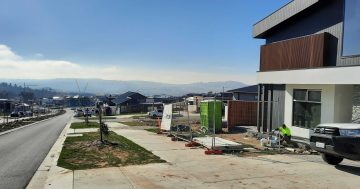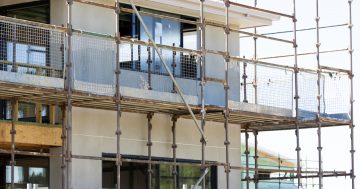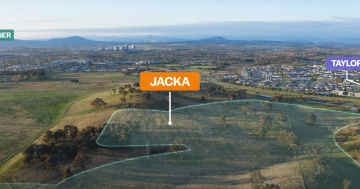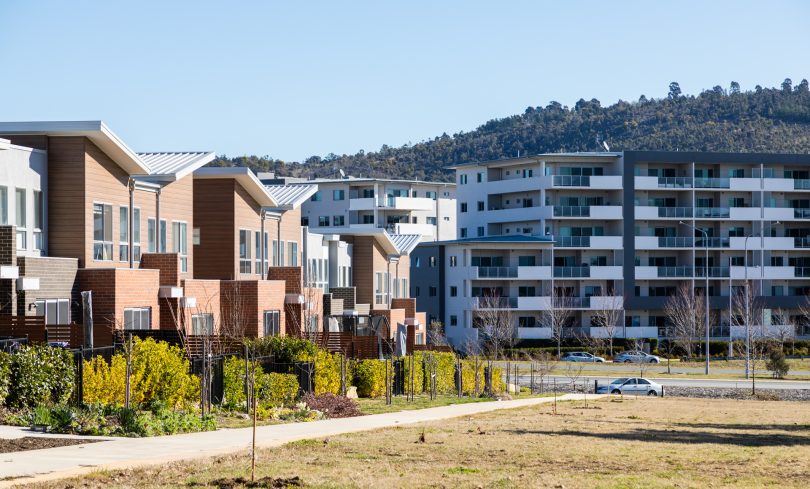
The ACT Government has extended its stamp duty cuts to include off-the-plan property purchases up to the value of $600,000. Photo: Michelle Kroll.
The ACT Government has further expanded its stamp duty cuts, meaning buyers who purchase off-the-plan properties up to the value of $600,000 could save more than $15,000.
This builds on an announcement made last year that scrapped stamp duty for purchases up to the value of $500,000. Chief Minister and Treasurer Andrew Barr has already signalled further annual changes are on the way as his government pursues ambitious reform of “inefficient taxes”.
Mr Barr said the measure is intended to help ease some of the pressure currently keeping many out of the housing market after a period of rapid price growth coupled with record low-interest rates.
“On the supply side, it’s a signal to build more properties under $600,000,” he said.
While that figure may seem low, Mr Barr was clear there “is the product available”, such as townhouses and units, in areas such as Tuggeranong, Woden, Belconnen, Gungahlin and Molonglo Valley.
“But we would like to see more, and that’s one of the reasons why this measure is targeted … at new housing. So it’s not chasing existing housing stock, it’s requiring new housing to be built,” he explained.
“This should be a very strong signal to industry that they’ve got to build more houses.”
As well as targeting those entering the property market for the first time, Mr Barr is hopeful pensioners and others looking to downsize from a family home to a unit or apartment will benefit, along with growing families that can take the larger homes.
He described it as leading to what economists describe as ‘allocative efficiency’.
“You get a better mix of people in the right type of housing to suit their stage of life,” Mr Barr explained.
That could be young people moving from a one-bedroom to a two-bedroom property or people looking to downsize but remain in their area.
Some, however, are calling for yet more to be done to meet some of the demand for housing in the ACT, particularly after a recent ballot where 12,300 registrations were received for only 71 blocks of land.
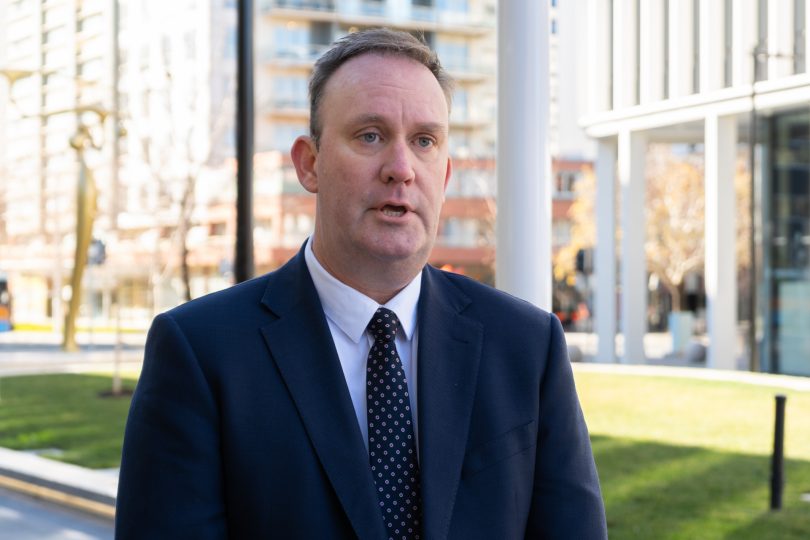
MBA ACT CEO Michael Hopkins said the government needed to look at cutting stamp duty on purchases of vacant land for detached houses as well. Photo: Region Media.
Master Builders ACT (MBA ACT) CEO Michael Hopkins said while he was pleased to see the government extend its duty cuts, it wouldn’t be enough to fulfil the demand for affordable housing.
“To provide equity across the new residential market, stamp duty should be cut for all residential purchasers, including vacant land for detached houses,” he said.
Mr Hopkins said the government was also constraining the supply of vacant residential land for detached housing, leading to significant price increases.
“Providing an adequate supply of affordable land for detached housing should be a priority of [the] government and cutting stamp duty would provide immediate relief for purchases,” Mr Hopkins noted.
Mr Barr, who has previously hit back at calls for the government to simply release more land to solve housing issues, said earlier this week (Tuesday, 15 March) the problem is that Canberra simply cannot sprawl outwards forever.
“There are obvious geographic boundaries, we can’t develop in our water catchment – that would be insane – and there are massive costs associated with endless urban sprawl,” he explained.
The Canberra Liberals described Mr Barr’s announcement as a “policy that looks good on paper” but will benefit no one.
Opposition Leader Elizabeth Lee said the policy was unlikely to have an actual impact on many, given most first-home buyers are already exempt from paying stamp duty anyway.
“What we are calling for is the [ACT Government] to take seriously the absolutely huge concerns about housing affordability. We know that Canberrans are wanting choices when it comes to housing – not just being restricted to high-rise, multi-dwelling apartments,” Ms Lee said.
Mr Barr, however, said the extension of the stamp duty cut was only one way the government was addressing housing issues.
Others included continuing to attract build-to-rent investments, partnering with the community housing sector on below-market rental projects and the delivery of public housing growth and renewal program, he said.
The new duty-free threshold will take effect from 1 April 2022.
















